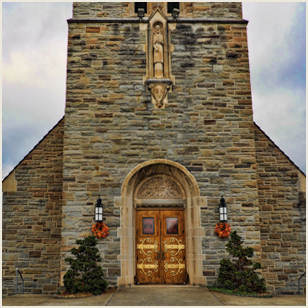Confession, Page: Quotes, Quote Topic, Repentance
Carefully examine your conscience, then. Cleanse and purify it to the best of your power by true contrition and humble confession, that you may have no burden, know of no remorse, and thus be free to come near. Let the memory of all your sins grieve you, and especially lament and bewail your daily transgressions.
–Thomas à Kempis (1380-1471)
Augustine (354-430), Page: Quotes, Quote Author, Quote Topic, Sainthood
There is no saint without a past, no sinner without a future.
–Saint Augustine (354-430)
Augustine (354-430), Love (others), Page: Quotes, Quote Author, Quote Topic
Beg God for the gift to love one another. Love all people, even your enemies, not because they are your brothers and sisters but so they may become such.
–Saint Augustine (354-430)
Augustine (354-430), Church, Eucharist, Page: Quotes, Quote Author, Quote Topic
The Lord has given us His Body and His Blood under the species of bread and wine, and as the bread is made out of many grains and the wine from many grapes, so the Church of Christ is made out of the multitude of the faithful united by charity.
–Saint Augustine (354-430)
Augustine (354-430), Death, Page: Quotes, Quote Author, Quote Topic
Do not live in fear of the last day, as though it were a thief coming to wreck your house while you sleep; but keep watch, and amend your life this day. Why put it off till tomorrow? If your life is to be long, let it be happy as well as long. No one puts off a good long dinner; and you would like a long evil life! If it is to be long, it will be all the better for being good. If it is to be short, it is as well that its fruits should last.
— Saint Augustine (354-430)
Grace, Page: Quotes, Quote Topic
All God’s gifts to us are beyond all beauty and are the origin of all our goodness, but there is nothing that can set our hearts on fire or move them to the love of goodness itself as much as the gift of divine understanding. It is the firstborn child of God’s grace and the first of the great gifts he gives to the soul. It starts by disconnecting us from our current obsessive desires and gives us, instead of our longing for corruptible things, a deepening love for the ineffable riches of divine comprehensions. From that point onward, the mind catches fire in a blaze of transcendence, so as to become a concelebrant in the liturgy of the angels.
–Saint Diadochus of Photike (c. 400 – c. 486)

